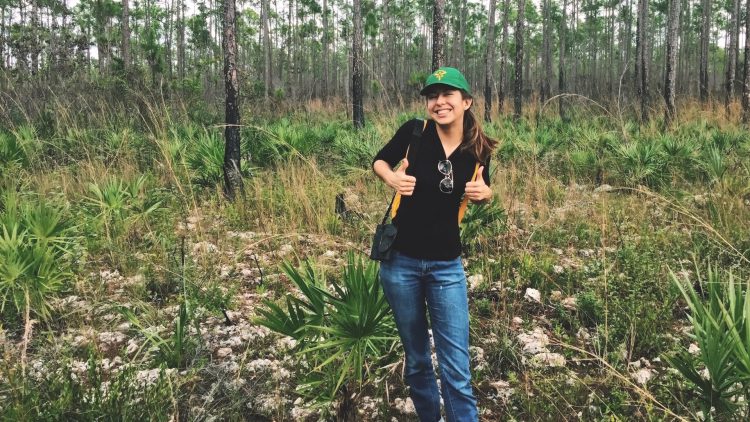Harvard University is putting the talents of Wolfson Campus Honors College student Salua Rivero to good use this summer as she works on a paid internship at Harvard Forest, an ecological research laboratory of the Ivy League school.
Rivero, a gifted artist with a passion for environmental causes, is focusing her work on the Eastern Hemlock, a tree native to New England. Under the guidance of Harvard faculty, she and others on her team are researching the cause of the species’ decline. The suspected culprit is the hemlock woolly adelgid, an exotic insect that might also be contributing to the decline of other plant species in the forest, which further upsets the delicate balance of that Northeastern ecosystem.
Head Start at EEI
The 19-year-old Rivero is well prepared for her Harvard job. For the past two years, she has been active in ecological causes both academically and with service learning projects at MDC, where she acted as president of the environmental YES! Club at Wolfson Campus and worked as a student assistant at MDC’s Earth Ethics Institute (EEI).
When she heard about the internship, she jumped at the chance to study at Harvard.
“I found out about the program through my Honors College Adviser Virginia Fuillerat,” Rivero said. “I was especially interested since the project had an art component to go along with the ecological work.”
The artistic side of the internship involves an arts communication project in which students develop strategies to present their research findings to the broader community. They will use a combination of two- and three-dimensional projects, including site-specific pieces, so as to raise awareness of the issue.
Just having completed her last semester at MDC, Rivero is considering her options for continuing her education. Befitting her interests in ecology, she is looking at baccalaureate programs that have a strong ecological or environmental focus.
“Right now, I am drawn primarily to small liberal arts schools, some of them in remote locations, like Warren Wilson College in North Carolina, which has a unique, hands-on curriculum,” Rivero said.
Speaking With Commissioners
While attending MDC, Rivero championed the cause of creatures who can’t speak for themselves. In March, she joined an EEI panel discussion on the state of the world’s oceans that included Miami-Dade County Commissioner Daniella Levine Cava, Captain Dan Kipnis and Miami-Dade County Chief Resilience Officer James Murley. On April 1, she marched with MDC students and community members at Miami’s Seaquarium to urge that orca whale Lolita be allowed to retire. Captured at age 4, Lolita has lived 47 years in captivity in a tank not even twice her body’s length. Those who led the protest have a clear plan for returning Lolita to a protected area in the North Pacific where her mother and grandmother still swim freely.
“It’s time that we, as people, show compassion for the species that are crying out in pain caused by our own ignorance,” Rivero said. “Lolita deserves to be released back home, before it is too late.”
Changemakers Excel Through GSELS
Rivero took several GSELS classes at MDC that strengthened her understanding of environmental issues. Through those GSELS courses, the Earth Ethics Institute (EEI) takes changemaking to new levels at MDC. The Institute’s Global Sustainability and Earth Literacy Studies (GSELS) Learning Network has expanded from a pilot endeavor in 2013 reaching 2,956 students to an EEI program of growing popularity reaching 10,076 students this year. In the spring semester alone, 74 faculty members offered 209 GSELS-designated courses, helping more than 5,200 students understand how human and community well-being are dependent on environmental health and resiliency. Through GSELS, EEI works to ensure wellness for all forever. Learn about teaching or taking GSELS courses at tinyurl.com/GSELSatEEI.
